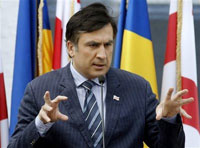Saakashvili should be tried for stupidity he committed in Georgia
As Georgia takes comes to grips with the damage inflicted by Russia's military campaign, President Mikhail Saakashvili seems likely to face the anger and frustration of tens of thousands of displaced Georgians.

For now, the Russian occupation of Georgia has rallied public support behind the Georgian leader. But opposition figures already hold him responsible for embroiling Georgia in a devastating war.
"Saakashvili should be tried for the stupidity that he has committed here," said Georgy Khaindrava, a former government minister who is now among the opposition. "But any trial should only happen after the barbarians have left our country."
The scope of the disaster has not yet sunk in with many here.
In the crumbling building that was once the Soviet military's regional headquarters here, jam the ground-floor office seeking blankets, cooking pots, dry goods and hope - something in increasingly short supply.
The situation may only get worse, as winter approaches and the suffering becomes more acute.
"I think we've been set back 10 years," said Teah Margishvili, 33, a refugee from the central town of Gori.
Political expert Ramaz Sakvarelidze said so long as Russian officials - including President Dmitry Medvedev - keep insulting Saakashvili and calling openly for his ouster, he'll likely retain some support.
"But it's hard to say what will happen next," Sakvarelidze said. "He has a lot to answer for."
The government is struggling to cope with the more than 120,000 refugees who fled south to escape the fighting. About 80,000 are housed in more than 600 centers in and around the capital, Tbilisi, many in school buildings.
With the school year scheduled to begin in September, and the cold weather not long after that, discontent from restless refugees could spread to the wider population, fueling impatience with government policies.
The country's already fragile economy will take years to recover. Billions of dollars (euros) will be needed to repair bridges, railroad links, roads, airports and other infrastructure. Food prices for fruits and vegetables in Tbilisi already are creeping upward.
"I'd rather be in my home than in a destroyed building," said Dato Dadasvhili, a 38-year-old farmer who fled a village in South Ossetia. "But I'm sure the country will be reunited again. I'm 100 percent sure."
In a recent interview with The Associated Press, Saakashvili said he was not concerned: "The last thing I'm worried about is about my political future right now."
The popularity of his government, he said, "will depend on how we will perform, how well we rebuild."
Saakashvili came to power during the mass opposition protests in 2003 known as the Rose Revolution, and vowed to remake this impoverished former Soviet nation in the South Caucasus into a modern country.
He focused on the economy, increasing social spending and raising monthly pensions. Tbilisi's cobblestone back streets and riverside plots are littered with hotel, shopping center and office construction projects.
Most Georgians praise Saakashvili for seeking to integrate the country into the European Union and NATO, and for trying to drag the country out from under Moscow's shadow.
But his popularity has waned, as corruption and widespread poverty has persisted, particularly outside of Tbilisi. The average monthly salary here is still only about US$225 (EUR 152).
Last year, police forces used tear gas, rubber bullets and truncheons to break up opposition protests in Tbilisi, prompting Saakashvili's government to shut down an independent TV channel for more than a month.
Western capitals condemned the moves and Saakashvili was forced to call an early election to defuse the crisis. He won the vote in January with around 53 percent of the vote.
Georgians also grew impatient with the unresolved status of the two breakaway regions, South Ossetia, at the center of the current conflict, and Abkhazia.
That impatience was shared by Saakashvili and hardline members of his government, and likely helped spur the order to fire rockets into the South Ossetian capital, Tskhinvali.
"It will be a difficult autumn and it will be a difficult winter," Khaindrava said. "And not just politically."
Subscribe to Pravda.Ru Telegram channel, Facebook, RSS!





